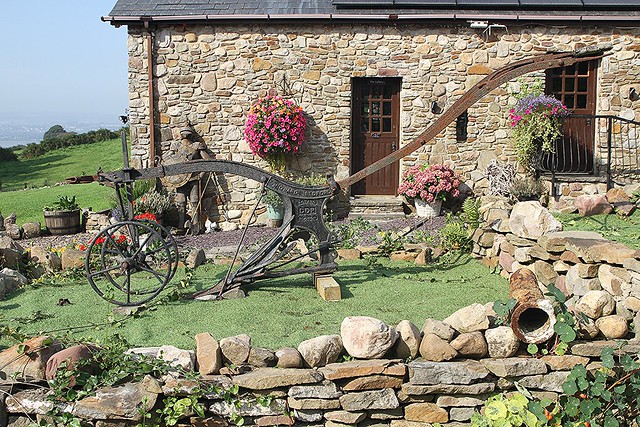Words for plough* and related things in Celtic languages.
*plough = plow for those of you in North America.
Words marked with a * are reconstructions.
| Proto-Celtic | *aratrom = plough |
|---|---|
| Old Irish (Goídelc) | arathar = plough, ploughing equipment, tillage airid = to plough airem = ploughman |
| Middle Irish (Gaoidhealg) | arathar = plough, ploughing equipment, tillage airem = ploughman, tiller airid = to plough, till airithe = ploughed |
| Irish (Gaeilge) | arathar = ploughing equipment, plough, ploughing (literary) air = plough (literary) |
| Scottish Gaelic (Gàidhlig) | àrach [aːrəx] = ploughshare, utensils for ploughing (archaic) |
| Manx (Gaelg) | erroo = ploughman, tiller of land errooid = cultivation, tillage, ploughmanship |
| Proto-Brythonic | *aradr [aˈradr] = plough |
| Middle Welsh (Kymraec) | aratrum, aradyr, aradr, aratr = plough aradrur, aradrwr = ploughman aradỽy, aradwy = arable or ploughed land |
| Welsh (Cymraeg) | aradr [ˈaradr/ˈaːradr] = plough, the Plough aradraf, aradu = to plough, till, cultivate aradrswch = ploughshare araduriaeth = (act of) ploughing, ploughmanship aradrwr = ploughman aradrwy = arable or ploughed land |
| Old Cornish | aradar = plough |
| Middle Cornish (Cernewec) | aradar, ardar, aratum = plough araderuur, arator = ploughmen aras = to plough, till |
| Cornish (Kernewek) | arader = plough araderor = ploughman aradow = arable aras = to plough |
| Middle Breton (Brezonec) | ararz, arazr = plough |
| Breton (Brezhoneg) | arar [ˈɑːrar] = plough aradeg = ploughing, ploughing competition aradenn = ploughing, surge of anger arat = to plough, spin |
Etymology: from Proto-Indo-European *h₂érh₃trom (plough), from *h₂erh₃- (to plough) and *-trom (instrumental suffix). Words from the same roots include ard (a simple plough consisting of a spike dragged through the soil) in English, arður (plough, profit, gain) in Icelandic, årder (plough) in Swedish, ader (plough) in Estonian and arado (plough) in Spanish [source].
| Proto-Celtic | *kanktus / *kanxtus = plough, plough beam |
|---|---|
| Old Irish (Goídelc) | cécht = plough-beam |
| Middle Irish (Gaoidhealg) | cécht, cecht = plough-beam, plough |
| Irish (Gaeilge) | céachta [ˈkeːx.t̪ˠə] = plough céachtaíl = ploughing céachtaire = ploughwright |
| Scottish Gaelic (Gàidhlig) | ceuchd = plough (obsolete) |
| Manx (Gaelg) | keeaght [ˈki.axt] = plough |
Etymology: from Proto-Celtic *kankā (branch), from Proto-Indo-European *ḱank- (branch). Words from the same roots include géag (branch, bough, limb) in Irish, cainc (branch) in Welsh, gancio (hook) in Italian, and gancho (hook, peg) in Spanish [source].
| Old Irish (Goídelc) | trebaid = to cultivate, till, plough, inhabit |
|---|---|
| Middle Irish (Gaoidhealg) | trebad = (act of) ploughing cultivating, husbandry trebaid = to cultivate, till, plough, inhabit, dwell |
| Irish (Gaeilge) | treabh [ˈtʲɾʲavˠ/ˈtʲɾʲəu] = to plough; till, cultivate, occupy, inhabit (literary) treabhadh = ploughing treabhdóir = ploughman |
| Scottish Gaelic (Gàidhlig) | treabh [tro] = to till (the ground), plough, cultivate, delve treabhadh = ploughing treabhta = ploughed, tilled, cultivated |
| Manx (Gaelg) | traaue = to plough (up), till, furrow, cleave, ploughing, tilling traauee = ploughing, contributing, to tillage traaueyder = ploughman |
Etymology: from Old Irish treb (house(hold), farm, tribe), from Proto-Celtic *trebā (dwelling), from Proto-Indo-European *treb- (dwelling, settlement) [source]. For more related words, see the post about Towns and Tribes.
| Middle Welsh (Kymraec) | gwyd, guyd = (wooden frame of a) plough |
|---|---|
| Welsh (Cymraeg) | gwŷdd [ɡwɨːð] = plough (North Wales), tree(s), branches, timber, masts, loom |
Sources: Wiktionary, Am Faclair Beag, Online Manx Dictionary, Teanglann.ie, eDIL – Electronic Dictionary of the Irish Language, In Dúil Bélrai English – Old Irish glossary, Geiriadur Prifysgol Cymru, Gerlyver Kernewek, Dictionaire Favereau, TermOfis, English – ProtoCeltic WordList (PDF), Etymological Dictionary Of Proto Celtic



Simon, I have to tell you, from this side of the pond, “plough” just looks so strange. If I didn’t know the word already and the subject matter, I would be very strongly tempted to pronounce this as “ploff”. After all, I already pronounce “trough” as “troff”, and “cough” as “coff”.
Tell me, just how did this UK vs. US conundrum ever see the light of day? I am flummoxed! Who can I blame?
I think Noah Webster might be responsible for the use of the spelling plow in North America, but both spellings have been around at least since the 15th century, according Google Ngram.
In Middle English it was written plouh, plow, plugh(e), plough(e) or plouw, from Old English plōh (hide of land, ploughland), and Old Norse plógr (plough), both of which come from Proto-Germanic *plōgaz, *plōguz (plough) [source].
Dear Robert: How about this sentence – “Plough thoroughly through a trough of rough dough in the lough.” Seven different pronunciations of ‘ough’! How do foreigners ever manage to learn English?
Shenn, I can read the whole sentence, except for “lough”. What the heck is a “lough”? Never heard of it.
Robert: ‘Lough’ is the anglicized spelling of the Scottish/Irish Gaelic word ‘loch’, meaning ‘lake’ in English. See, for example, this Wikipedia entry: – https://en.wikipedia.org/wiki/Lough_Erne